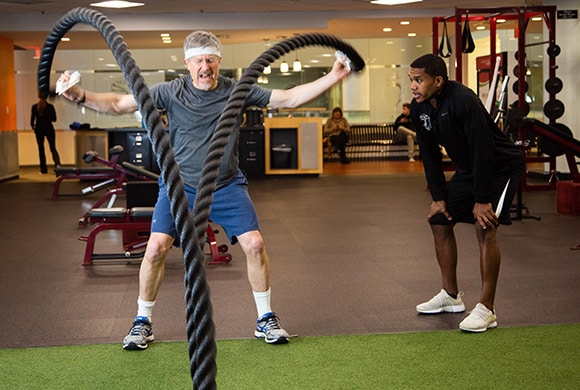No Pain No Gain? One Personal Trainer’s Perspective.

Written by Philippe Orlando, Personal Trainer
We’ve all heard the old expression – “no pain, no gain.” Some in my industry believe it is taboo. We should never say that because it’s too intimidating and clients won’t want to train with us; or it’s too risky – you might get sued if your client gets an injury and you had conveyed a message that contributed to him overdoing it. Some people call me a bit of a hard-ass, which is not my intention; but I do want to be a realist. Don’t get me wrong, I’m not the drill sergeant personal trainer who yells “no pain, no gain” in his client’s faces. But there is no question that intense exercise (for those who can do it safely) is far more effective than easy exercise, and yes – intense exercise can cause some temporary discomfort or “pain.”
I try to recognize, at all times, the fleeting, unstable and temporal nature of everything I do and feel. What I have today might be gone tomorrow. This is true for my job, objects I value, and certainly for my body and what it can do at a particular time, including pain or discomfort from exercise. I transform the discomfort I feel into another experience – me functioning at a higher level.
While it is in our nature to feel a sense of permanence in almost every area of our life, including our bodily experiences, this is an illusion. We are all being fooled by the relatively long span of human life and our seeming ability to repeat any kind of experience forever. We really don’t have this ability. We are fooled by our ability to function for a long time in a very comfortable state. But if we never push beyond our comfort zone, we are actually just avoiding landmarks needed to realize that we are indeed declining – wasting away, slowly, unnoticeably, but surely nonetheless. If all you do is sit at a desk all day, you will never feel that the ability to sit at a desk is slipping away. You will always be able to sit at a desk. It’s only at a more extreme degree of function that you can become aware of your fleeting abilities. Talk to a 60 year old who has enjoyed running his entire life. He knows that at 18 he was able to run a four minute mile. He is certainly more aware of the temporal and fleeting nature of the human physical experience than someone who never ran at 18 and does not run today. If you have no landmark, you won’t see where you are, where you were, and where you are going. Exercise is an awareness and an assessment tool; a check of “where am I today?”
Every time you do something, consider that it could be the last time you do it. So the next time you exercise and you reach some uncomfortable limits, try to actually view this as another way of being in the present moment in a way that is specific to today and might not happen again…ever. When you push yourself, and start to feel the discomfort from your hard working muscles or lungs, try to cherish it! Embrace this discomfort as a form of active meditation. Unlike the more common passive meditation – comfortably resting and focusing on calm breathing; with this active meditation focus on what your body is feeling while you are pushing it beyond comfortable limits. Learn how to look inward at your biological machine in action. This is another form of awareness. This is mindfulness while functioning while under controlled stress. Be amazed! “Wow, I can do that! Yes, I feel the burn in my muscles, yes it’s hard to breath; this is very tough, but it’s me.” The more you observe the discomfort of intense exercise, the more you turn inward and try to appropriate the feeling, the more you’ll have control over it.
Life, too often, happens at one range of our natural spectrum – the pleasant one. We seek pleasure all the time and we think we deserve it. But discomfort is a part of the human experience and is what at the end of the day can make us better if we learn how to subject ourselves to it without apprehension, but rather with control and as something part of us. Discomfort is just our body telling us we are entering a zone we are not used to. Exercise physiologists will say that homeostasis is being disturbed and your body perceives this as a threat. Your mind must take over.
Pain is relative. A shift in mindset can help us put the discomfort of exercise into a new perspective; can make us more in tune with our bodies; can enable us to embrace what we feel; and ultimately can help us better experience, enhance and prolong our life.
